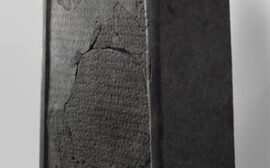By: Scott Reynolds, D.Min., Ph.D. Cand. | March 13, 2022
The problems of evil and suffering have perplexed humanity throughout history. “Journalist and best-selling author Lee Strobel commissioned George Barna, the public-opinion pollster, to conduct a nationwide survey. The survey included the question “If you could ask God only one question and you knew he would give you an answer, what would you ask?” The most common response offered by 17% of those who could think of a question was ‘Why is there pain and suffering in the world?’”[1] Most people simply want answers to questions like “Why do bad things happen to good people?” The average person has not considered the theological implications of evil in the world, they simply want to protest the moral injustices seeming to plague our world today.
The problem of evil is a real question raised by theist and atheist alike. If there is an omnipotent, omniscient, wholly good God who created the world, then why is there evil in the world? Atheologians like J. L. Mackie and H. J. McCloskey have concluded that the mere existence of evil in the world is a direct and irreconcilable contradiction to the existence of an omnipotent, omniscient, wholly good God. “Mackie and McCloskey can be understood as claiming that it is impossible for all the following statements to be true at the same time:
- God is omnipotent (that is, all-powerful).
- God is omniscient (that is, all-knowing).
- God is perfectly good.
- Evil exists.
Any two or three of them might be true at the same time; but there is no way that all of them could be true. In other words, (1) through (4) form a logically inconsistent set.”[2] Others have developed additional arguments regarding the logical inconsistencies found in the problem of evil. William Rowe stated:
- There are gratuitous evils.
- If there are gratuitous evils, then the theistic God doesn’t exist.
- The Theistic God doesn’t exist.
The G. E. Moore shift can be used to counter Rowe’s conclusion by shifting the argument to include man’s limited cognitive ability to understand God’s mind.
- God exists.
- If there are gratuitous evils, then the theistic God doesn’t exist.
- Then there are no gratuitous evils.
Moore shifted the argument away from God’s character and placed the focus on God’s will by defining gratuitous evils as those evils incapable of producing any known or unknown good. Alvin Plantinga’s free will defense moves the focus from God’s will to the “free will of humanity.” Plantinga states: God can create free creatures, but he cannot cause or determine them to do only what is right. For if he does so, then they are not significantly free after all; they do not do what is right freely. To create creatures capable of moral good, therefore, he must create creatures capable of moral evil; and he cannot leave these creatures free to perform evil and at the same time prevent them from doing so. The free will defense does not solve the question of God’s existence but gives a logical defense of how God and evil can both exist.
Following Plantinga’s free will defense, the Glory of God theodicy presented in this work will not try and answer the question of God’s existence but will demonstrate how an omnipotent, omniscient, wholly good God can exist while humanity lives in a world of natural suffering and moral evil. Roderick Chisholm has added an axiological argument to the problem of evil through his ideas of “balancing off” and “defeating” intrinsic goods and evils. In his work, The Defeat of God and Evil, he states, “If what I have said about defeat is correct, then the answer to this question is at least not obviously negative. For it would seem that a world that is at least as good as any other possible world could contain states of affairs that are intrinsically bad- provided that the badness of each of these states of affairs is defeated.”[3] In other words, something evil may happen as long as something of greater good comes from it. The idea of adding value to good and evil leads philosophers like Mackie to ask, “Does it still hold that good and evil are opposed?”[4] If they are opposed, a more specific question might be, are they opposites of equal value? Mackie has addressed the ideas of first-order goods and first-order evils, second-order goods, and second-order evils, and so on. In so doing, he leads himself and others to ask whether there is a good of equal value for the gratuitous evils done in the world today. When Rowe answered this question in response to work by Stephen Wykstra, he concluded that even humanity’s possession of the good gift of “free will” was not of enough “value as to merit God’s permission of the horrendous moral evils in the world.”[5] Rowe’s conclusion seems like a logical argument for the problem of evil; however, God has a greater good not found in the physical pleasures of the earth. If evil is of greater value than good, it is reasonable to conclude that something outside of good and evil is of a greater value than evil.
It is the contention of this work to demonstrate that the only thing capable of filling a moral space greater than good and evil is the glory of God. The Glory of God theodicy is built on the following valid argument.
- Premise A: There is an omnipotent, omniscient, wholly good God who created a world where the greatest good is the maximizing of his glory.
- Premise B: The omnipotent, omniscient, wholly good God could prevent the means of Natural Suffering and Moral Evil, unless doing so sacrifices some part of his glory.
- Conclusion: Natural Suffering and Moral Evil are a limited part of the means used by the omnipotent, omniscient, wholly good God to maximize his glory through the free will of his creation.
The presence of evil and the existence of God are not inconsistent conclusions if we find the purpose for the existence of evil. All humanity worships God, either through voluntary means leading to and springing from the individual’s salvation; or through the involuntary means of judgement: Philippians 2:9–11 (CSB).[6] Voluntary worship leads to eternity in heaven while involuntary worship leads to an eternity in hell. Gratuitous evil is not the cause of these classifications but is part of the means used to reveal the individual’s chosen response to God’s glory.
Perpetrators of gratuitous evil evaluate their choice in that moment and choose to follow the moral desire in their heart. In that choice they have decided to reject God’s moral plan and push God’s glory further away, leading them towards involuntary worship. Victims of evil deal with the pain and suffering of enduring their encounter with evil and choose how they will respond to the evil forced on them. Will their encounter with evil push them towards a worldly response of vengeance and hatred, or a God-like response of forgiveness and grace?
The victim’s response is crucial to finding justification for the victim. If the victim chooses to respond with grace and trust in God, then the greater good of their voluntary worship of God’s glory allows them to enjoy the eternal blessings of the afterlife in the presence of God’s love and mercy in heaven. If the victim chooses to respond with hatred towards God for allowing it to happen, then the only greater good realized is the glorification of God through the involuntary worship of the victim in eternity. Humanity needs God for the benefits of eternity; sadly, they more often than not reject God’s relationship, believing what was done to them was of greater evil than what humanity has done, and continues to do, to God. The status of victim does not supersede the glory of God. The presence of suffering and evil are means to draw humanity to God; therefore, an individual’s rejection of God’s invitation to be in relationship with him still glorifies God as judge. Hell is not the failure of the cross, it is not the failure of God’s character, or of his power. It is the full presence of God’s wrath towards an individual’s sin while also being the eternal location of the full absence of God’s love.
Perpetrator and victim are both bound by the same standards in the doctrine of soteriology. (Romans 3:10–12; Romans 3:23; John 14:6; 2 Corinthians 5:21) The equal standing before the glory of God of a perpetrator who committed evil and a victim who endured suffering seems unfair. The cognitive limitations of humanity make it impossible to understand the ways of God; however, Philip Yancey recorded the helpful words of Dorothy Sayers: “For whatever reason God chose to make man as he is – limited and suffering and subject to sorrows and death – he has the honesty and courage to take his own medicine. Whatever game he is playing with his creation, he has kept his own rules and played fair. He can exact nothing from man that he has not exacted from himself.”[7] Ultimately, God has communicated that his glory is of greater value than humanity’s comfort: 1 Peter 4:13–16. As Stephen was being stoned for having faith in Jesus Christ: Acts 7:55–56. The most important account in the Bible regarding the Glory of God theodicy is in Job: Job 1:8–12. Using the accounts recorded of Job’s life and Plantinga’s free will defense the Glory of God theodicy will work to move its argument from a valid argument to a sound argument.
The problem of evil has four crucial questions that must be answered for a theodicy to be able to face the atheologian’s scrutiny.
- Why is there any evil at all?
- Why are there the types and kinds of evil in the world?
- Why are there the amounts of evil in the world?
- Why are there particular evils in the world?
Free Will Worship
Why is there any evil at all? The worship of a free will humanity (containing both voluntary and involuntary worship) glorifies God. The responses of humanity demonstrated in the midst of natural suffering and moral evil glorifies God through both a voluntary pursuit of God’s will and a rejection of God’s will in favor of the individual’s free will.
As Job received the news that his children were dead, his work destroyed, and his wealth stolen. (Job 1:20–22) Job had no understanding of why this evil was done to him, why he had to suffer. Yet he responded with voluntary worship and trust in God’s character. Job’s response was the response God desired to see. (Job 2:3) Job had no understanding why God allowed these evils to fall on him and he felt justified questioning God for a reason. Job 38-40 is one of the longest messages from God recorded in Scripture but nowhere in it does he give Job a reason for his suffering. Instead, God shows Job his strength and reminds him that “I am God and you are my creation:” (Isaiah 45:9)
Job maintained his innocence throughout his suffering. He did not enjoy the suffering, nor should anyone believe they are obligated to enjoy suffering. The accounts of Job’s life reveal a man who did not understand why he suffered at the hands of evil but at the same time a man who never lost sight of God’s glory.
Free Will Identity
Why are there the types and kinds of evil in the world? The unique personalities in humanity desire, seek, protect, and even crave different things, and evil is birthed out of an individual’s design and environment: James 1:13–15.
A metaphysical study of an individual’s identity shows how each person is drawn to characteristics, actions, and pleasures deemed to be intrinsically good. The problem with self-identification regarding intrinsically good behavior is the lack of an absolute standard. People pursue evil acts because of what they feel they gain from the evil. Free will identity is built into the DNA of humanity. Even before evil entered the world, Eve was justifying her desire to sin. Her identity, even before sin entered the world, was bent towards gaining what she did not have: Genesis 3:6a. Eve demonstrated the free will to identify with the benefits of sin even before sin and evil entered the world: Genesis 3:6b.
Humanity does not engage in evil acts for the purpose of doing evil. The goal of humanity is to create self-defined goods capable of creating a positive state of affairs. The problem of free will identity is when a perpetrator believes, “What I need to be happy, or what I need to help me develop a positive state of affairs for myself is control over another person.” The variety of evil experienced in the world today is due to the free will identity each person demonstrates through personal decisions bent towards their desired outcomes.
Psychologists are working with philosophers to study the idea of moral identity: “The focus of psychology is on moral functioning, on why one acts as one does in morally challenging situations, or even on why one commits oneself to moral responsibility and integrity over a lifetime.”[8] People maintain moral beliefs for a variety of reasons, however moral authority must be autonomous for it to become a part of the individual’s identity. An individual’s moral identity is as unique as their design and environment. Free will identity accepts that autonomous moral reason will serve as the overriding authority in how the individual will use his or her free will.
Free Will Threshold
Why are there the amounts of evil in the world? Free will threshold is the point at which an individual will always choose X (a predictable result). At a certain point of circumstances an individual’s response will become predictable (positively or negatively). The positive (good) is the response needed to produce the results most conducive to maximizing God’s glory through voluntary worship. The negative (evil) is the response needed to produce the results most conducive to maximizing God’s glory through the free will choice of involuntary worship. (1 Corinthians 10:13)
The amount of evil needed for atheologians to believe God does not exist is an arbitrary amount. Each person will individually decide what classifies as a gratuitous act of evil (amount based on quality) or the exact number of atrocities committed in the world (amount based on quantity). The concept of the amount of evil is arbitrary due to a lack of consensus amongst philosophers and theologians.
The amount of evil in the world, both quality and quantity, can best be answered through the idea of humanity’s free will threshold, where X (the point at which an individual’s response is predictable) is different for each individual, therefore the amount and kinds of evil needed for that individual to act or respond is different.
The argument being present in this theodicy requires the acceptance of expanded standard theism as it demands the existence of the afterlife and influence of non-human being in the spiritual realm. In the account of Job, God allowed Satan to be the instrument of suffering and temptation into Job’s life yet only to the point of his threshold. Job experienced heinous acts of evil but was still able to choose to maintain his integrity. God limited Satan’s original attack, allowing Job to be under his X threshold. The demonstration of God’s limits on Satan’s freedom is consistent with the message found in 1 Corinthians 10:13.
The question is often asked, “If God exist then why did he allow Hitler to live and carry out the atrocities of the holocaust?” The very question is connected to the argument on the amount of evil in the world. Could God have lowered the worst moral evils and natural sufferings? The standard answer regarding this question is the conceptual “best possible world” theory. The recorded actions of God reveal a different answer to the question. The worst atrocities recorded in the Bible were done as extreme opportunities to draw humanity back to God or as punishment for gratuitous disobedience to him.
Every time God ordered the destruction of a people, it was always accompanied by an opportunity for salvation. The true equality of God’s character concerning the destruction of one people group at the hands of another due to their moral depravity is in Amos 2 as God punishes Judah and Israel. (Amos 2:4)
The destruction and exile of Israel at the hands of foreign nations was always due to their disobedience and was accompanied with a promise of restoration as a part of repentance. The atheologian will reject that if God did exist, no omnibenevolent God could use tyrants like Hitler and Nebuchadnezzar to draw people to himself.
Each time Israel repents, or we see other nations turn to God’s glory, like Nineveh, we see the true purpose of allowing free will. Each response to evil demonstrates worship. The X threshold is the distinct point where each person is assured that the decisions they are making are free will choices.
Free Will Response
Why are there the particular evils that there are? Why is this particular evil or suffering here right now? God’s ultimate goal through humanity is to receive glory by drawing humanity unto Himself. Two thousand years ago Hebrew disciples asked a well-known Rabbi, Why? Why is there evil and suffering? (John 9:2–3)
Every human has been affected by some form of natural suffering or has fallen victim to a particular act of evil. The individual acts of suffering and evil experienced in the world exist as a part of a greater scheme designed by non-human free creatures, namely Satan and demons (Ephesians 6:11), in continual attempts to maximize their works to draw individual responses to the point of involuntary worship. The individual’s response to that suffering or evil forms a conscious decision on what to do with God’s glory. Satan will influence circumstances to inflict the maximum level of pain allowed by God. The very existence of a non-human free will creature with powers outside the restraints of creation has taken evil to gratuitous levels.
The reason for the existence of Satan can be found in the same answer Jesus gave his disciples about the suffering of the blind man. Satan does not exist because God is not omnipotent or omniscient or wholly God; Satan exists so that God’s glory might be displayed through him. Job found a new level of voluntary worship he had never experienced before the evil that had befallen him. (Job 42:1–6)
The pain and evil Job endured had done what God had set out for it to do. Job’s integrity and faithful worship of God during this season of suffering brought incredible glory to God. The glory of God is not just seen in the responses of the faithful but also in the judgement of the wicked. Hell is not the failure of the cross but merely the glory of God shown through the power to judge those who reject his gift of salvation. (Proverbs 16:4)
The free will responses of humanity are all inside the glory of God. God has stated that his desire is for all to be saved, but he willingly allows each human to make that decision. Each and every particular act of evil done, or painful suffering endured was designed by Satan to move each unique person to their free will X threshold to reject God. God is maximizing his glory through the individual response of each person as they choose a position of voluntary or involuntary worship.
About the Author
 Dr. Scott Reynolds earned his D.Min from New Orleans Baptist Theological Seminary and is a Ph.D. Candidate in the Theology and Apologetics program at Liberty University. In addition to his doctoral pursuits, he has earned degrees from Troy University. Dr. Reynolds has traveled the world and has served as an archaeologist with some of the biggest names in the field. He brings a passion for biblical studies, biblical history, and an expertise in archaeological studies. Dr. Reynolds is a retired pastor and church planter. He has taught at New Orleans Baptist Theological Seminary and now is now working archaeological digs in a pursuit of discovering the apologetic properties of archaeology. Scott and his wife Lori have two grown children, one granddaughter, and a very spoiled dog.
Dr. Scott Reynolds earned his D.Min from New Orleans Baptist Theological Seminary and is a Ph.D. Candidate in the Theology and Apologetics program at Liberty University. In addition to his doctoral pursuits, he has earned degrees from Troy University. Dr. Reynolds has traveled the world and has served as an archaeologist with some of the biggest names in the field. He brings a passion for biblical studies, biblical history, and an expertise in archaeological studies. Dr. Reynolds is a retired pastor and church planter. He has taught at New Orleans Baptist Theological Seminary and now is now working archaeological digs in a pursuit of discovering the apologetic properties of archaeology. Scott and his wife Lori have two grown children, one granddaughter, and a very spoiled dog.
Notes
[1]“Logical Problem of Evil | Internet Encyclopedia of Philosophy,” n.d. https://www.iep.utm.edu/evil-log/ (accessed July 27, 2018).
[2] Ibid.
[3] Ibid., 67.
[4] Ibid., 31.
[5] Daniel Howard-Snyder, ed., The Evidential Argument from Evil (Bloomington: Indiana University Press, 1996), Kindle Location 7286.
[6] Christian Standard Bible (Nashville, TN: Holman Publishing, 2017).
[7] Philip Yancey, Where Is God When It Hurts? (Grand Rapids, MI: Zondervan, 1990), 228.
[8] Daniel K. Lapsley, Moral Development, Self, and Identity (Lawrence Erlbaum Associates, 2004), 22.
© 2022. Bellator Christi.






We need to start addressing the false teachings that are being espoused, such as Replacement Theory and false teachings about The Elect, and Anti Semitism. That being said, I loved your paper. Keep up the good work
[…] Source: The Glory of God Theodicy […]